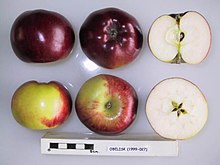Flamenco (apple)
Appearance
| 'Flamenco' apple | |
|---|---|
 | |
| Hybrid parentage | (Cox's Orange Pippin x Court Pendu Plat) × Wijcik McIntosh |
| Cultivar | 'Flamenco' or 'Ballerina Obelisk' |
| Origin | |
Flamenco, also known as Ballerina Obelisk, is a cultivar of domesticated apple that bears apples good for eating fresh, and is grown for its unusual ornamental properties. The tree grows in a straight up columnar style, with many small fruit-bearing branches.[1] 'Flamenco' is one of a series of apple tree cultivars that share a registered trademark under the name Ballerina.
Flamenco was developed in Kent, England, between the years 1950 and 1999 by the East Malling Research Station, when they crossed a hybrid of the English Cox's Orange Pippin and the French Court Pendu Plat with the "Wijcik McIntosh", which itself is a columnar mutation of the Canadian McIntosh apple.[2][3][4]
References
- ^ "Colannade Flamenco Apple". Sprouts Greenhouse. Archived from the original on 31 December 2014.
- ^ Bai, T.; Zhu, Y.; Fernández-Fernández, F.; et al. (2012). "Fine genetic mapping of the Co locus controlling columnar growth habit in apple". Molecular Genetics and Genomics. 287: 437–450. doi:10.1007/s00438-012-0689-5. PMID 22526430.
- ^ Sarwar, M.; Skirvin, R.M.; et al. (1998). "Selecting dwarf apple (Malus × domestica Borkh.) trees in vitro: multiple cytokinin tolerance expressed among three strains of 'McIntosh' that differ in their growth habit under field conditions". Plant Cell, Tissue and Organ Culture. 54: 71–76. doi:10.1023/A:1006157611836.
- ^ Flamenco at Orange Pippin
Further reading
- Coombs, D.; Blackburne-Maze, P.; Cracknell, M.; Bentley, R. (2001). "Tree Fruits Outdoors and Under Glass". In Coombs, D. (ed.). The Complete Book of Pruning. pp. 167–197. ISBN 9781841881430.
